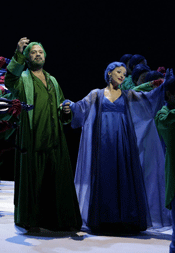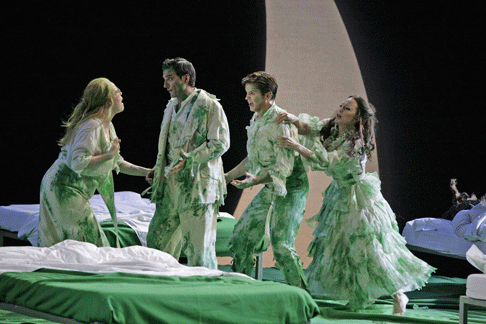
21 Jun 2009
Britten’s Midsummer Night’s Dream Charms La Scala
Robert Carsen’s production of Benjamin Britten’s A Midsummer Night’s Dream is not new, as the La Scala playbill suggests.
English Touring Opera are delighted to announce a season of lyric monodramas to tour nationally from October to December. The season features music for solo singer and piano by Argento, Britten, Tippett and Shostakovich with a bold and inventive approach to making opera during social distancing.
This tenth of ten Live from London concerts was in fact a recorded live performance from California. It was no less enjoyable for that, and it was also uplifting to learn that this wasn’t in fact the ‘last’ LfL event that we will be able to enjoy, courtesy of VOCES8 and their fellow vocal ensembles (more below …).
Ever since Wigmore Hall announced their superb series of autumn concerts, all streamed live and available free of charge, I’d been looking forward to this song recital by Ian Bostridge and Imogen Cooper.
The Sixteen continues its exploration of Henry Purcell’s Welcome Songs for Charles II. As with Robert King’s pioneering Purcell series begun over thirty years ago for Hyperion, Harry Christophers is recording two Welcome Songs per disc.
Although Stile Antico’s programme article for their Live from London recital introduced their selection from the many treasures of the English Renaissance in the context of the theological debates and upheavals of the Tudor and Elizabethan years, their performance was more evocative of private chamber music than of public liturgy.
In February this year, Albanian soprano Ermonela Jaho made a highly lauded debut recital at Wigmore Hall - a concert which both celebrated Opera Rara’s 50th anniversary and honoured the career of the Italian soprano Rosina Storchio (1872-1945), the star of verismo who created the title roles in Leoncavallo’s La bohème and Zazà, Mascagni’s Lodoletta and Puccini’s Madama Butterfly.
Evidently, face masks don’t stifle appreciative “Bravo!”s. And, reducing audience numbers doesn’t lower the volume of such acclamations. For, the audience at Wigmore Hall gave soprano Elizabeth Llewellyn and pianist Simon Lepper a greatly deserved warm reception and hearty response following this lunchtime recital of late-Romantic song.
Collapsology. Or, perhaps we should use the French word ‘Collapsologie’ because this is a transdisciplinary idea pretty much advocated by a series of French theorists - and apparently, mostly French theorists. It in essence focuses on the imminent collapse of modern society and all its layers - a series of escalating crises on a global scale: environmental, economic, geopolitical, governmental; the list is extensive.
For this week’s Live from London vocal recital we moved from the home of VOCES8, St Anne and St Agnes in the City of London, to Kings Place, where The Sixteen - who have been associate artists at the venue for some time - presented a programme of music and words bound together by the theme of ‘reflection’.
'Such is your divine Disposation that both you excellently understand, and royally entertaine the Exercise of Musicke.’
Amongst an avalanche of new Mahler recordings appearing at the moment (Das Lied von der Erde seems to be the most favoured, with three) this 1991 Mahler Second from the 2nd Kassel MahlerFest is one of the more interesting releases.
‘And there was war in heaven: Michael and his angels fought against the dragon; and the dragon fought and his angels, And prevailed not; neither was their place found any more in heaven … that old serpent … Satan, which deceiveth the whole world: he was cast out into the earth, and his angels were cast out with him.’
If there is one myth, it seems believed by some people today, that probably needs shattering it is that post-war recordings or performances of Wagner operas were always of exceptional quality. This 1949 Hamburg Tristan und Isolde is one of those recordings - though quite who is to blame for its many problems takes quite some unearthing.
There was never any doubt that the fifth of the twelve Met Stars Live in Concert broadcasts was going to be a palpably intense and vivid event, as well as a musically stunning and theatrically enervating experience.
‘Love’ was the theme for this Live from London performance by Apollo5. Given the complexity and diversity of that human emotion, and Apollo5’s reputation for versatility and diverse repertoire, ranging from Renaissance choral music to jazz, from contemporary classical works to popular song, it was no surprise that their programme spanned 500 years and several musical styles.
The Academy of St Martin in the Fields have titled their autumn series of eight concerts - which are taking place at 5pm and 7.30pm on two Saturdays each month at their home venue in Trafalgar Square, and being filmed for streaming the following Thursday - ‘re:connect’.
The London Symphony Orchestra opened their Autumn 2020 season with a homage to Oliver Knussen, who died at the age of 66 in July 2018. The programme traced a national musical lineage through the twentieth century, from Britten to Knussen, on to Mark-Anthony Turnage, and entwining the LSO and Rattle too.
With the Live from London digital vocal festival entering the second half of the series, the festival’s host, VOCES8, returned to their home at St Annes and St Agnes in the City of London to present a sequence of ‘Choral Dances’ - vocal music inspired by dance, embracing diverse genres from the Renaissance madrigal to swing jazz.
Just a few unison string wriggles from the opening of Mozart’s overture to Le nozze di Figaro are enough to make any opera-lover perch on the edge of their seat, in excited anticipation of the drama in music to come, so there could be no other curtain-raiser for this Gala Concert at the Royal Opera House, the latest instalment from ‘their House’ to ‘our houses’.
"Before the ending of the day, creator of all things, we pray that, with your accustomed mercy, you may watch over us."

Robert Carsen’s production of Benjamin Britten’s A Midsummer Night’s Dream is not new, as the La Scala playbill suggests.
It has a long history; it was a major hit of the 1991 Aix-en-Provence Festival International d’Art Lyrique. The rich and costly staging was then co-produced with the Opéra Nationale de Lyon. In the last 18 years, it has traveled to many countries; in Italy, in the 1990s, it had a few performances at the Ravenna Festival and Ferrara Musica. In both towns the opera house is comparatively small and the stage not much larger that that of Aix-en-Provence. Carsen has reviewed and updated the staging many a time. Further stagings are now programmed all over Europe and, supposedly, in the USA.
The opera itself had been conceived for a specific event: the reconstruction, in 1960, of the Jubilee Hall in Aldelburgh, where Britten and his lifetime partner, the tenor Peter Pears, were living. Even though the reconstruction implied an increase in space, the Hall could accommodate no more than 316 people. It had a simple wooden stage (with no modern machinery or equipment), the pit was designed for a small orchestra (nearly a chamber music ensemble), although the opera required 18 soloists and a children chorus. At that time, Britten was working on a project to reduce the cost of opera productions and to make them transportable from town to town; he thought that this was the only feasible strategy to make opera survive in the post- World War II era. As a part of this strategy, in 1945, he gave a new start to the Glyndebourne Festival in Sussex, and in 1947 he created the English Opera Group - a touring company with limited means to bring opera even to small towns of the UK, Switzerland and the Netherlands. Some of his operas (“The Rape of Lucretia”, “Curlew River”, the Church musical pieces) were composed for this project. Even his attempt at “grand opera,” “Billy Budd,” had also a version with only two pianos and a slightly reduced number of soloists.
Against this backdrop, the Scala “A Midsummer Night’s Dream” is a departure from Britten’s chamber opera yet still far from his two forays into “grand opera” (“Gloriana”, in addition to “Billy Budd”) . Britten’s writing is eclectic; it is rooted in the British tradition since Purcell but it incorporates also Berg’s technique of adopting a theme on which to build each individual musical scene, though Britten does not turn his back on a tonal approach. Another aspect - especially relevant to “A Mid-Summer”- is his capacity to obtain colour from a small orchestral ensemble and the counterpoint of a large number of vocal soloists. Finally, in “Midsummer,” he explores the magic of the night and assigns to the fairies the most “unearthy” vocal register: a coloratura soprano (Tytania) and a counter-tenor (Oberon).
After 18 years, the production is still fresh. Carlsen, then very young, saw “A Midsummer” as an exploration of eroticism - from that of the very young (the two fugitive couples) to that of the adult (Tytania and Oberon) to that of the peasants. The set is wide green with beds (two huge ones in the first act, six “queensize” in the second act, and three, suspended above the stage, in the first part of the third act) until the final scene in a white but dull Athens.

Sir Andrew Davis conducted a chamber music ensemble: two harps, a harpsichord, a small number of violins and cellos, brass and percussion. The small orchestra performance is the best part of the performance, the crystal-clear and transparent texture is a real thrill. A mostly British cast gave excellent acting performances. The Rosemary Joshua sang a sexy “coloratura” Tytania, and quite good also were the two young couples (Gordon Gietz, David Adam Moore, Deanne Meek and Erin Wall). David Daniels is a virtuoso countertenor but his volume is better suited to a small concert house than to the large La Scala auditorium (where the acoustic is less than perfect).
Giuseppe Pennisi